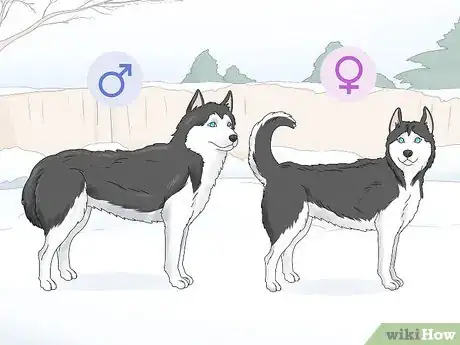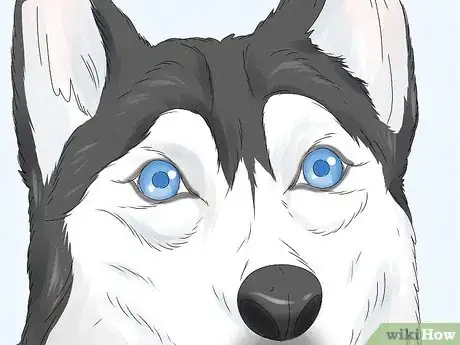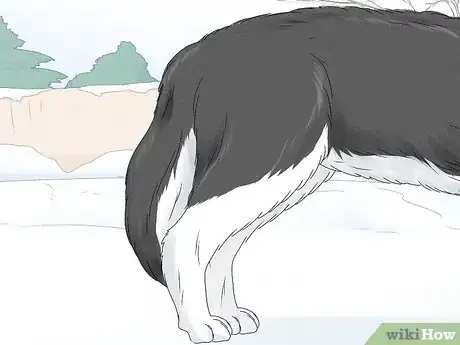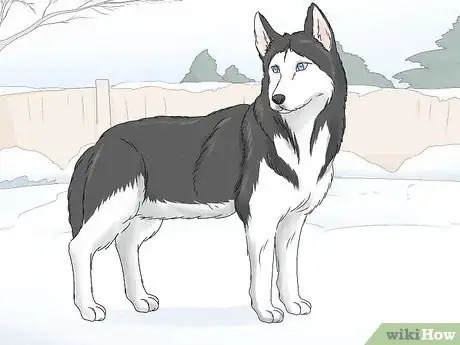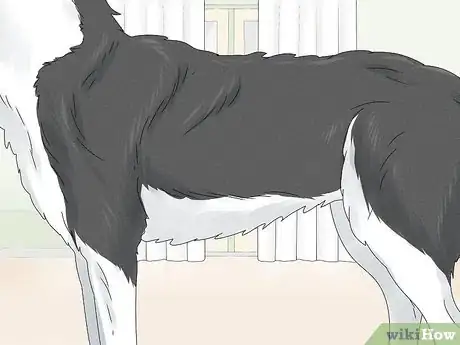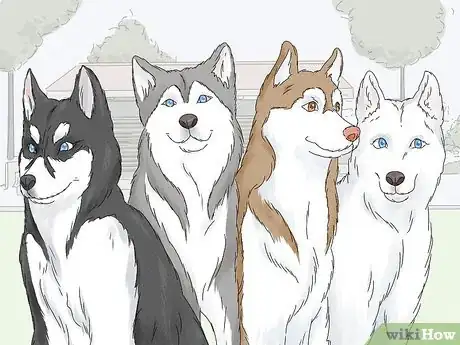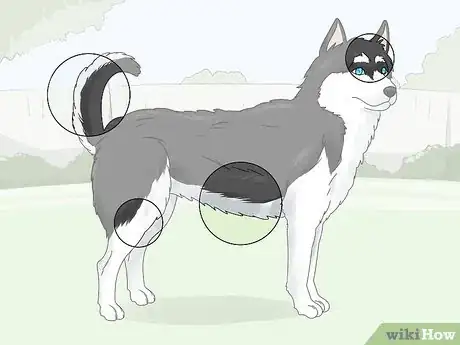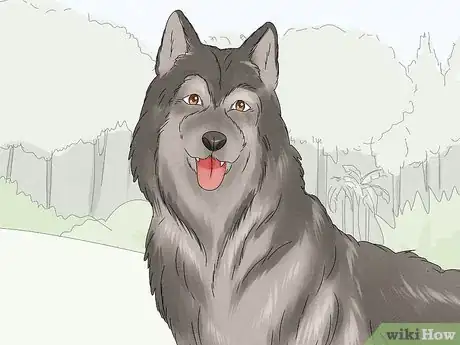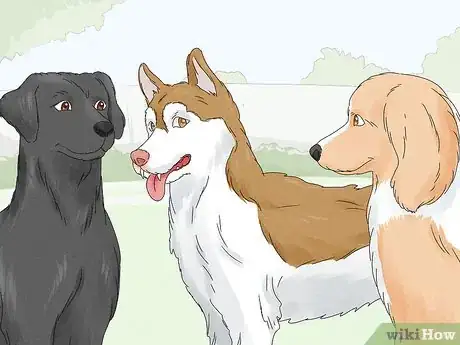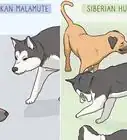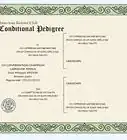This article was co-authored by Beverly Ulbrich. Beverly Ulbrich is a Dog Behaviorist and Trainer and the Founder of The Pooch Coach, a private dog training business based in the San Francisco Bay Area. She is a Certified CGC (Canine Good Citizen) Evaluator by the American Kennel Club and has served on the Board of Directors for the American Humane Association and Rocket Dog Rescue. She has been voted the best private dog trainer in the San Francisco Bay Area 4 times by SF Chronicle and by Bay Woof, and she has won 4 "Top Dog Blog" awards. She has also been featured on TV as a dog behavior expert. Beverly has over 18 years of dog behavior training experience and specializes in dog aggression and anxiety training. She has a Master of Business Administration from Santa Clara University and a BS from Rutgers University.
This article has been viewed 120,817 times.
One of the most popular dog breeds,[1] the Siberian Husky is known for being a sled dog. It can easily be confused with an Alaskan Malamute, another dog sometimes used to pull sleds, if you don't know the differences; however, the Siberian Husky does have some key traits. This wikiHow will help you understand whether a dog is a Siberian Husky.
Steps
Inspecting the Body Structure
-
1Check the dog's size. Siberian Huskies are medium-sized members of the working group.[2] Males are 21–23.5 inches (53–60 cm) tall and weigh 45–60 pounds (20–27 kg), while females are 20–22 inches (51–56 cm) tall and weigh 35–50 pounds (16–23 kg).[3]
Did you know? Because Siberian Huskies are noticeably much smaller and lighter than Alaskan Malamutes, breeders and fanciers of the breed refer to it as the "Siberian" rather than the "Husky" because the latter implies a larger, brawnier dog than that described in the breed standard of the Siberian Husky.[4]
-
2Look at the ears. Siberians have thick ears that are triangular. They are medium in size, set high, strongly erect, and slightly rounded at the tips.[5]Advertisement
-
3Inspect the eyes. The eyes of a Siberian Husky are almond-shaped and moderately spaced. They may be blue or brown, or a dog may have one of each color.[6]
-
4
-
5See the dog's overall body structure. A Siberian's body is well-furred and moderately compact. They have firm muscles, a straight back, and a smooth, seemingly effortless gait.[9]
Looking at the Coat
-
1
-
2Understand that a Siberian's coat may be any color. A Siberian Husky may be any color, from black to solid white.[12] Other colors seen include grey, brown, and red.
-
3Notice white markings. Many Siberians have white markings. These can be found on the tail, stomach, chest, and legs. It is common to see a variety of markings on the head, as well.[13]
-
4Look for the agouti coat. "Agouti" is a special term used to describe a Siberian Husky with a coat of "alternating bands of light and dark" along the fur of the coat.[14] Not all Siberians are seen with this coat resembling wolf-coloring, but it may appear.
Checking Temperament
-
1Notice high energy levels. Every dog has its own energy level, regardless of breed. However, Siberian Huskies tend to be more energetic than others. As sled dogs, it is natural for them to need lots of exercise to release their energy.[15]
-
2Watch for independent thinking. Siberians are intelligent but won't necessarily be quick to follow commands. They are clever and good at solving problems, so training may take some extra effort.[16]
-
3Look for a desire to be around others. Siberian Huskies are pack dogs. They enjoy being around people and other dogs, if they have been properly socialized.[17]
-
4See if the dog has a high prey drive. Siberians enjoy the company of people and other canines, but when it comes to other small animals, Siberians can demonstrate a high prey drive.[18] It is important to train a Siberian Husky to get along with these other animals.
-
5Check for friendliness. Siberian Huskies are generally very friendly. They can make good family pets if they are socialized and get enough of an energy release.[19]
Community Q&A
-
QuestionAre purebred dogs better than mixed breed dogs?
 LinnieTop AnswererWhether purebred or mixed breed dogs are better is a matter of opinion. Purebred dogs are prone to more health problems because of the passing on of similar genes, but they are also bred for temperament. Mixed breeds are at a lower risk for health concerns but are not bred for temperament, so it can be hard to know how one will behave, especially if the parents' breeds are unknown. You can decide for yourself whether you prefer purebred or mixed breed dogs.
LinnieTop AnswererWhether purebred or mixed breed dogs are better is a matter of opinion. Purebred dogs are prone to more health problems because of the passing on of similar genes, but they are also bred for temperament. Mixed breeds are at a lower risk for health concerns but are not bred for temperament, so it can be hard to know how one will behave, especially if the parents' breeds are unknown. You can decide for yourself whether you prefer purebred or mixed breed dogs. -
QuestionHow long do Siberian huskies live?
 LinnieTop AnswererSiberian huskies have a life expectancy of 12 to 14 years. They are a relatively healthy breed, so health concerns are not as prevalent, allowing them to live long lives.
LinnieTop AnswererSiberian huskies have a life expectancy of 12 to 14 years. They are a relatively healthy breed, so health concerns are not as prevalent, allowing them to live long lives. -
QuestionDo Siberian huskies, poodles, and golden retrievers get along?
 LinnieTop AnswererSiberian huskies and golden retrievers typically get along well with other dogs, though poodles prefer the company of people over other dogs. However, if first introduced to the other dogs at an early age, the three could surely get along very well.
LinnieTop AnswererSiberian huskies and golden retrievers typically get along well with other dogs, though poodles prefer the company of people over other dogs. However, if first introduced to the other dogs at an early age, the three could surely get along very well.
References
- ↑ https://www.akc.org/dog-breeds/siberian-husky/
- ↑ https://www.akc.org/dog-breeds/siberian-husky/
- ↑ https://www.akc.org/dog-breeds/siberian-husky/
- ↑ https://www.akc.org/dog-breeds/siberian-husky/
- ↑ http://images.akc.org/pdf/breeds/standards/SiberianHusky.pdf
- ↑ http://images.akc.org/pdf/breeds/standards/SiberianHusky.pdf
- ↑ http://images.akc.org/pdf/breeds/standards/SiberianHusky.pdf
- ↑ http://images.akc.org/pdf/breeds/standards/SiberianHusky.pdf
- ↑ http://images.akc.org/pdf/breeds/standards/SiberianHusky.pdf
- ↑ http://images.akc.org/pdf/breeds/standards/SiberianHusky.pdf
- ↑ http://images.akc.org/pdf/breeds/standards/SiberianHusky.pdf
- ↑ http://images.akc.org/pdf/breeds/standards/SiberianHusky.pdf
- ↑ http://images.akc.org/pdf/breeds/standards/SiberianHusky.pdf
- ↑ https://www.akc.org/about/glossary/
- ↑ https://www.dogtemperament.com/siberian-husky-temperament/
- ↑ https://www.dogtemperament.com/siberian-husky-temperament/
- ↑ https://www.dogtemperament.com/siberian-husky-temperament/
- ↑ https://www.dogtemperament.com/siberian-husky-temperament/
- ↑ https://www.dogtemperament.com/siberian-husky-temperament/
